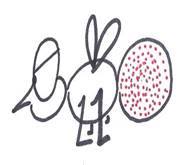

Drawing by Luca Guerrini
SymbioVec - Yeast symbionts of malaria vectors: from basic research to the management of malaria control
http://d7.unicam.it/symbiovec/content/eu
Advances in biotechnology propose innovative tools particularly relevant for public health application by genetic manipulation of microbial symbionts of arthropod vectoring disease. The symbiont engineering prevents the transmission of pathogens to human by interfering with their stage within the arthropod, thorough the expression of anti-pathogen effector molecules. This approach, defined paratransgenesis is simpler than the proposed engineering of the vector itself (transgenesis) and implies minor applicative and ethical concerns. Identification of good candidate for paratransgenesis has opened the way towards the investigation of microbes residing in the arthropod body, particularly those localised within the gut that often represents the locale in which pathogens transit or develop. Good paratransgenic candidates were already identified in the bug vectoring Chagas disease in South America and in the tse-tse fly vectoring sleeping sickness in Africa. As regard mosquitoes, responsible of tens of human infections including malaria, some interesting bacteria have been recognized as candidates for genetic manipulation, even if the ability of recombinant strains to cure mosquito has not been demonstrated yet in the field. Bacteria can be easily isolated, modified and reintroduced in the mosquito but secretion of antagonists by prokaryotic cell can represent a matter difficult to resolve. In this context endosymbiotic yeasts seem to be very appealing. Their genetic and cellular complexity makes yeasts as ideal tools for manipulation and bypasses many difficulties relative to the recombinant products releasing. On these bases, I have recently begun a study on the yeast microflora in mosquito. Particularly, I investigated the relationship between the yeast endosymbiont Pichia anomala and malaria vectors. Considering the special features of this yeast, I propose its use as paratransgenic tool for malaria control.
Coordinator: UNIVERSITA DEGLI STUDI DI CAMERINO Italy
Start date: 2012-06-01 / End Date: 2017-05-31
Info at Cordis: http://cordis.europa.eu/project/rcn/103726_en.html
Acronimo: SymbioVec
Soggetto finaziatore: Unione Europea
Programma di Finanziamento e bando: ERC-2011-StG_20101109
Numero del progetto/Contratto: 281222
Responsabile Scientifico: Prof.ssa Irene Ricci
Scuola / Struttura: Bioscienze e Medicina Veterinaria
ruolo Unicam: Coordinator/Host Institution
Tipo di finaziamento: VII Programma Quadro
LaunTeNaBio - Launch Test of Natural Biocides for the Control of Insect Borne Diseases
Insect-Borne Diseases (IBDs) affecting animals and plants are an increasing problem burdening the economy and the social conditions of many countries. The growing concern is that climatic changes, globalization and increase in travel and trade have fostered the spread of insect populations in new geographic areas and with them many IBDs. It is now established that Europe must face an increasing risk of vector-borne outbreaks. Mosquito-borne infections affect millions of people all over the world every year, with severe implications for public health and a devastating economic impact in endemic countries. Phytophagous insects transmit diseases to plants of agronomic importance, seriously damaging food production and heavily compromising the well-being of local populations, especially in countries whose economy is mainly based on agriculture. Solving or alleviating IBDs is a global challenge, but effective and safe tools are not yet available. The main approach is based on the use of insecticides to reduce or eliminate the insect-vector populations, but this approach has dual limitations of undesired effects on the environment and insect development of resistance to these substances. Effective strategies are needed to overcome these drawbacks, contributing to solutions in a practical and forward-looking way. Two main aspects for an innovative control strategy are the reduction of costs for anti-IBDs campaigns, and the attraction of potential users to promote technology transfer and implementation. The proof of concept proposed by LaunTeNaBio is the realization of a Launch Test of Natural Biocides starting from an innovative product containing symbiotic yeasts (KysBio) to prevent IBDs of health or agricultural significance. LaunTeNaBio intends to accomplish the objective by supporting a rising spinoff by the marketing of KYsBio through businesses.
Start date/End Date: 18 mesi – 1 Aprile 2019 – 30 Settembre 2020
Extension request for force majeure – Covid19 emergency and lockdown: 31st March 2021
Real Duration 24 months: 1st April 2019 – 31st March 2021
Acronimo: LaunTeNaBio
Soggetto finaziatore: Unione Europea
Programma di Finanziamento e bando: Horizon 2020 - ERC POC 2018
Numero del progetto/Contratto: 842429
Responsabile Scientifico: Prof.ssa Irene Ricci
Scuola / Struttura: Bioscienze e Medicina Veterinaria
ruolo Unicam: Coordinatore di progetto
Partner:
Nome: BIOVECBLOK S.r.L
Tipologia: Spin off Unicam (start up innovativa)
Stato: Italia
Ruolo: Partner
Tipo di finaziamento: Horizon 2020


